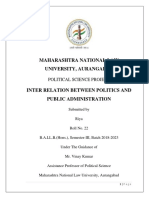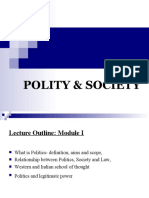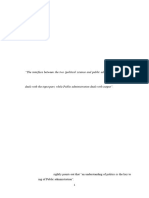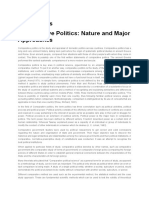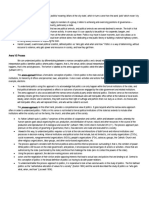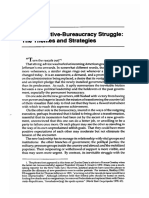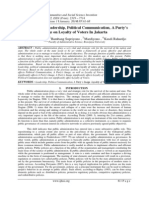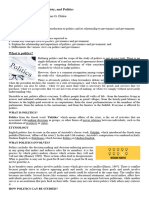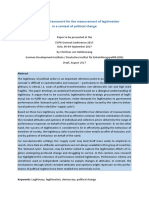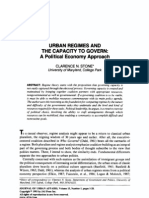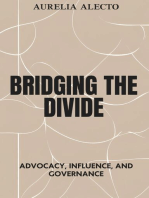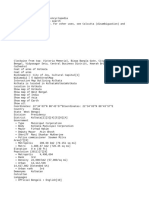Comparative Politics Lecture Notes 1
Comparative Politics Lecture Notes 1
Uploaded by
Shruti ChaudharyCopyright:
Available Formats
Comparative Politics Lecture Notes 1
Comparative Politics Lecture Notes 1
Uploaded by
Shruti ChaudharyOriginal Title
Copyright
Available Formats
Share this document
Did you find this document useful?
Is this content inappropriate?
Copyright:
Available Formats
Comparative Politics Lecture Notes 1
Comparative Politics Lecture Notes 1
Uploaded by
Shruti ChaudharyCopyright:
Available Formats
lOMoARcPSD|15635635
Comparative Politics - Lecture notes 1
Comparative Politics (Aligarh Muslim University)
Studocu is not sponsored or endorsed by any college or university
Downloaded by 1085 Ayushi Verma (vermaayushi18110@gmail.com)
lOMoARcPSD|15635635
Comparative Politics
As a new term coined in the 1950s, "comparative
politics" reflects an expansion of the field of study.
This new method of studying politics was made
possible in large part because of the widespread
dissatisfaction with the traditional descriptive
approach.
"Comparative politics" refers to the comparative
study of government structures and political
organisations from around the world.
'Predicament' is a constant, timeless, ever-changing,
and universal activity that manifests itself in politics.
Civil association members think and speak about
their organisations' arrangements and conditions
from a desired perspective, propose changes to
these policies, and try to persuade others of their
merits. They also act in a manner designed to
promote these changes. This is the stuff of politics
Political activity, the legislative process, and political
power are all distinct concepts in comparative
politics.
Downloaded by 1085 Ayushi Verma (vermaayushi18110@gmail.com)
lOMoARcPSD|15635635
A reduction or resolution of conflicts is inevitable
when long-term mechanisms for stress reduction are
in operation.
If politics is defined as the allocation of "values," a
conflict between people's values and those of the
men in power is inevitable. This leads to a rise in
political activity as a result of efforts to resolve
conflicts.
At the point of secession or civil war, "two sides
allocate their values differently," not an authoritative
allocation of values.
End of all political activity is known as "political rest".
The same way that political stalemate does not open
a new cycle of political activity, it also closes it. " "
Political process refers to the procedures by which
private organisations in a state attempt to influence
the government, participate in policy-making by the
government, or become the government.
There must be consideration given to non-state
associations' "governments," which operate in a way
that influences and is influenced by the national
government.
Downloaded by 1085 Ayushi Verma (vermaayushi18110@gmail.com)
lOMoARcPSD|15635635
To put it another way, the government is like a
machine that takes in information and outputs
something else. As a general rule, the government
operates this way.
One of the main focuses of comparative politics is
'political power'. The term "power" has been defined
in a variety of ways by different authors. "A certain
kind of human relationship," says Carl J. Friedrich,
while Tawney describes it as "the capacity for an
individual or a group to modify the conduct of other
individual or group members as he desires."
At its most basic, politics refers to an attempt to
influence the actions of others toward one's own
goals. Defined as "the entire spectrum of those
external influences that, when brought to bear on an
individual, can make him move in the required
direction," power can be described in this manner
with precision.
It is impossible to study politics "properly" if the roles
of the ruling and non-ruling elites are not identified
and measured. the true nature of C and the reason
for her existence
Downloaded by 1085 Ayushi Verma (vermaayushi18110@gmail.com)
You might also like
- Politics, Governance, and Other Key ConceptsNo ratings yetPolitics, Governance, and Other Key Concepts22 pages
- The Politics and Administration DichotomyNo ratings yetThe Politics and Administration Dichotomy4 pages
- 2024-Method of Comp Pol-3309 Lecture Note3No ratings yet2024-Method of Comp Pol-3309 Lecture Note315 pages
- Unit 1: Nature and Scope of Comparative Politics: ObjectivesNo ratings yetUnit 1: Nature and Scope of Comparative Politics: Objectives17 pages
- Maharashtra National Law University, Aurangabad: Political Science ProjectNo ratings yetMaharashtra National Law University, Aurangabad: Political Science Project18 pages
- Introduction To Politics and GovernanceNo ratings yetIntroduction To Politics and Governance61 pages
- Unit I. Fundamentals of Political Science: Prepared By: Levy Richard B. IsidroNo ratings yetUnit I. Fundamentals of Political Science: Prepared By: Levy Richard B. Isidro71 pages
- Characteristics of Political DevelopmentNo ratings yetCharacteristics of Political Development6 pages
- Modern Approaches To Comparative Politics, Nature of Comparative Politics50% (2)Modern Approaches To Comparative Politics, Nature of Comparative Politics32 pages
- Comparative Politics Meaning & Nature and Scope96% (24)Comparative Politics Meaning & Nature and Scope9 pages
- The Politics and Administration DichotomyNo ratings yetThe Politics and Administration Dichotomy6 pages
- 2faf0political Science Semester 1 Study Material0% (1)2faf0political Science Semester 1 Study Material33 pages
- Comparative Politics - Meaning, Scope and Its Evolution - Political SystemNo ratings yetComparative Politics - Meaning, Scope and Its Evolution - Political System6 pages
- Carino 1992 Bureaucracy For A DemocracyNo ratings yetCarino 1992 Bureaucracy For A Democracy21 pages
- International Journal of Humanities and Social Science Invention (IJHSSI)No ratings yetInternational Journal of Humanities and Social Science Invention (IJHSSI)8 pages
- Philippine Politics - Government and Citizenship Week 1 - Politics and GovernmentNo ratings yetPhilippine Politics - Government and Citizenship Week 1 - Politics and Government38 pages
- Politics, Analyzing A Multifaceted Phenomenon100% (1)Politics, Analyzing A Multifaceted Phenomenon41 pages
- A Conceptual Framework For The Measurement of Legitimation in A Context of Political ChangeNo ratings yetA Conceptual Framework For The Measurement of Legitimation in A Context of Political Change27 pages
- Philippine Politics and Governance: Political ScienceNo ratings yetPhilippine Politics and Governance: Political Science8 pages
- 3/12/2021 Obi-Okafor Ifesinachuk WU 10314991GE IRD 107 AssignmentNo ratings yet3/12/2021 Obi-Okafor Ifesinachuk WU 10314991GE IRD 107 Assignment5 pages
- (Proceedings of the British Academy'',) Duncan Kelly (Editor) - Lineages of Empire_ the Historical Roots of British Imperial Thought (Proceedings of the British Academy)-Oxford University Press, USA (No ratings yet(Proceedings of the British Academy'',) Duncan Kelly (Editor) - Lineages of Empire_ the Historical Roots of British Imperial Thought (Proceedings of the British Academy)-Oxford University Press, USA (241 pages
- The Role of Women in The French RevolutionNo ratings yetThe Role of Women in The French Revolution5 pages
- ENGLISH 10 ĐÈ CƯƠNG ÔN TẬP GIỮA KỲ 2 ĐỀ revisedNo ratings yetENGLISH 10 ĐÈ CƯƠNG ÔN TẬP GIỮA KỲ 2 ĐỀ revised3 pages
- 2023-2024 Class Program & Teaching LoadNo ratings yet2023-2024 Class Program & Teaching Load94 pages
- Property Rights. A Practical Guide To Freedom and ProsperityNo ratings yetProperty Rights. A Practical Guide To Freedom and Prosperity99 pages
- Letter To DAS Re Search Terms 10.25.2021No ratings yetLetter To DAS Re Search Terms 10.25.20213 pages
- List of Contesting Candidates: Election Commission of IndiaNo ratings yetList of Contesting Candidates: Election Commission of India2 pages
- Peran Integritas Nasional Dalam Memperkuat Kemajemukan Negara Indonesai Yang Berlandasan Pancasila Dan KebinekaanNo ratings yetPeran Integritas Nasional Dalam Memperkuat Kemajemukan Negara Indonesai Yang Berlandasan Pancasila Dan Kebinekaan9 pages
- The Propagandists Journey (Rizal's Search For Reforms)No ratings yetThe Propagandists Journey (Rizal's Search For Reforms)2 pages
- Decolonizing Theory From Within or Without? A Reply To BaumNo ratings yetDecolonizing Theory From Within or Without? A Reply To Baum5 pages
- BARC Recruitment 2022 Notification PDF Click To CheckNo ratings yetBARC Recruitment 2022 Notification PDF Click To Check9 pages
- Unit 1: Nature and Scope of Comparative Politics: ObjectivesUnit 1: Nature and Scope of Comparative Politics: Objectives
- Maharashtra National Law University, Aurangabad: Political Science ProjectMaharashtra National Law University, Aurangabad: Political Science Project
- Unit I. Fundamentals of Political Science: Prepared By: Levy Richard B. IsidroUnit I. Fundamentals of Political Science: Prepared By: Levy Richard B. Isidro
- Modern Approaches To Comparative Politics, Nature of Comparative PoliticsModern Approaches To Comparative Politics, Nature of Comparative Politics
- Comparative Politics - Meaning, Scope and Its Evolution - Political SystemComparative Politics - Meaning, Scope and Its Evolution - Political System
- International Journal of Humanities and Social Science Invention (IJHSSI)International Journal of Humanities and Social Science Invention (IJHSSI)
- Philippine Politics - Government and Citizenship Week 1 - Politics and GovernmentPhilippine Politics - Government and Citizenship Week 1 - Politics and Government
- A Conceptual Framework For The Measurement of Legitimation in A Context of Political ChangeA Conceptual Framework For The Measurement of Legitimation in A Context of Political Change
- Philippine Politics and Governance: Political SciencePhilippine Politics and Governance: Political Science
- 3/12/2021 Obi-Okafor Ifesinachuk WU 10314991GE IRD 107 Assignment3/12/2021 Obi-Okafor Ifesinachuk WU 10314991GE IRD 107 Assignment
- Bridging the Divide: Advocacy, Influence, and GovernanceFrom EverandBridging the Divide: Advocacy, Influence, and Governance
- (Proceedings of the British Academy'',) Duncan Kelly (Editor) - Lineages of Empire_ the Historical Roots of British Imperial Thought (Proceedings of the British Academy)-Oxford University Press, USA ((Proceedings of the British Academy'',) Duncan Kelly (Editor) - Lineages of Empire_ the Historical Roots of British Imperial Thought (Proceedings of the British Academy)-Oxford University Press, USA (
- Property Rights. A Practical Guide To Freedom and ProsperityProperty Rights. A Practical Guide To Freedom and Prosperity
- List of Contesting Candidates: Election Commission of IndiaList of Contesting Candidates: Election Commission of India
- Peran Integritas Nasional Dalam Memperkuat Kemajemukan Negara Indonesai Yang Berlandasan Pancasila Dan KebinekaanPeran Integritas Nasional Dalam Memperkuat Kemajemukan Negara Indonesai Yang Berlandasan Pancasila Dan Kebinekaan
- The Propagandists Journey (Rizal's Search For Reforms)The Propagandists Journey (Rizal's Search For Reforms)
- Decolonizing Theory From Within or Without? A Reply To BaumDecolonizing Theory From Within or Without? A Reply To Baum
- BARC Recruitment 2022 Notification PDF Click To CheckBARC Recruitment 2022 Notification PDF Click To Check











